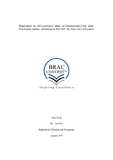Representation of consumer culture in contemporary literature: from Roland Barthes' Mythologies to Will Self's The Sweet Smell of Psychosis
Abstract
Consumer culture, although a mark of industrial economy, has turned into the norm
of advancement in the contemporary global society. The structure of modern capitalism is
based on the production and consumption of goods. From the 1980s, with the expansion of
globalization, all modern and late modern society has embraced the practice of consumer
culture. Just as the societies are heavily influenced by consumer culture, so is the world of
arts. From the rise of popular culture, we see the influence of consumer cultures in
traditional literature. This thesis deals with the themes of consumer cultures in postmodern
literature. One of the prominent themes of postmodern texts depicts the perception of
consumer culture, as it is the norm of western and non-western society. In literary world
there are also attempts to represent this new world. I have taken three novels namely: The
Crying of Lot 49 by Thomas Pynchon, White Noise by Don DeLillo and The Sweet Smell
of Psychosis by Will Self. I also take one collection of short stories name: Mythologies by
Roland Barthes to represent this consumer culture in the Western world from 1950s.
Roland Barthes is perhaps the first literary critique who depicted the mythical power of
consumer culture. He discussed the idea of present day mythology about advertisement of
daily used French products in his book Mythologies (1959). The other writers have
depicted consumer culture in much more detail way in their writings and in different social
contexts: USA and UK. This thesis examines these literary works which demonstrate the
fearful world of consumer culture and media domination.
Description
This thesis is submitted in partial fulfillment of the requirements for the degree of Masters of Arts in English, 2016.Department
Department of English and Humanities, BRAC UniversityType
ThesisCollections
- Thesis, B.A. (English) [647]

